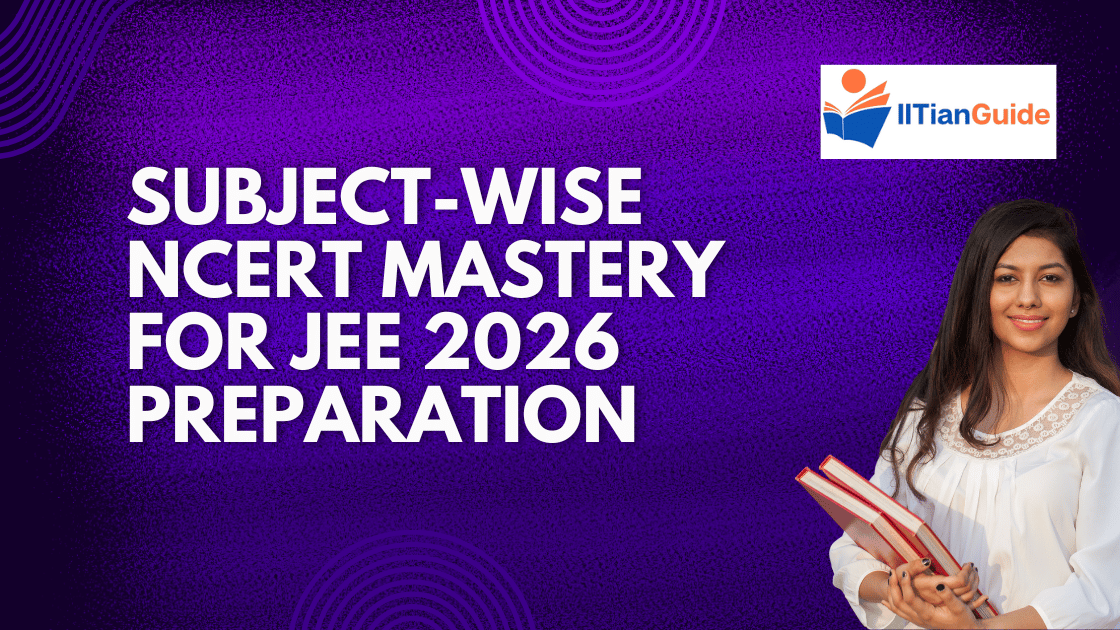Subject-Wise NCERT Mastery for JEE 2026 Preparation

NCERT textbooks are not just for school board exams. They are the foundation for JEE preparation. If studied the right way, NCERTs can also help with Olympiads and national-level science competitions.
Many top scorers in JEE 2026 and past years credit their success to a solid command over NCERT books, especially in Chemistry. This blog breaks down subject-wise strategies to master NCERT and shows how it benefits not only JEE but also CBSE boards and Olympiads.
Why NCERT is Crucial for JEE 2026
Before diving into subjects, understand why NCERT mastery matters:
- Authentic content directly aligned with JEE syllabus.
- Simple and clear explanations.
- Strong conceptual foundation.
- Many JEE questions (especially in JEE Main) are directly picked or inspired from NCERT.
- Covers all CBSE board exam requirements.
- Offers useful base for Olympiad preparation, especially in junior levels like NSEJS, NSEC, NSEP.
Subject-Wise NCERT Preparation Strategy
1. NCERT Physics for JEE 2026
Physics in NCERT is known to be conceptual, but not exhaustive for JEE Advanced. However, it lays a strong base.
How to Master NCERT Physics:
- Read line-by-line: Every statement in NCERT Physics is valuable. Even JEE Advanced MCQs have been framed on exact NCERT lines.
- Focus on conceptual clarity from NCERT, then shift to HC Verma or DC Pandey for applications.
- Diagrams and illustrations in NCERT are important. They’re often ignored, but are helpful in understanding topics like mechanics, optics, and electromagnetism.
- For Boards: Solve all exercises.
- For JEE: Solve NCERT examples + derivations, then apply on advanced problems.
Chapters Where NCERT is a Must:
|
Chapter |
Relevance |
|
Units and Measurements |
Very High |
|
Thermodynamics |
High |
|
Current Electricity |
High |
|
Semiconductors |
Direct Qs in JEE |
2. NCERT Chemistry for JEE 2026
NCERT Chemistry is the most important for JEE. Especially in Inorganic and Organic Chemistry, questions are often directly copied.
How to Master NCERT Chemistry:
- Memorise NCERT lines – especially Inorganic Chemistry. JEE Main asks many direct factual questions from this.
- Make your own summary notes.
- For Organic Chemistry, NCERT reaction mechanisms and flowcharts are crucial.
- For Physical Chemistry, understand and solve NCERT numericals first before trying from other books.
Chapters Where NCERT is Enough for JEE:
|
Topic |
Coverage by NCERT |
|
Chemical Bonding |
90% |
|
Coordination Compounds |
100% |
|
Organic Reaction Mechanisms |
85% |
|
P-block Elements |
100% |
Many JEE Advanced 2024 Chemistry questions were from NCERT either directly or conceptually.
3. NCERT Maths for JEE 2026
NCERT Maths is often underrated. While not sufficient for JEE Advanced problems, it’s an essential starting point.
How to Master NCERT Maths:
- Solve all examples and exercises. NCERT helps build strong basics in algebra, calculus, and coordinate geometry.
- Focus on definitions, theorems, and formulae.
- Understand each step in NCERT solutions. Many Olympiad-level questions are modifications of NCERT problems.
- Ideal for CBSE Boards and building initial confidence before jumping into books like Cengage or Arihant.
Topics Where NCERT Maths Helps Most:
|
Topic |
Role of NCERT |
|
Sets, Relations, Functions |
Complete Conceptual Base |
|
Matrices & Determinants |
Very Useful |
|
Probability |
Board & JEE Usage |
|
Calculus |
Foundation-level |
Benefits Beyond JEE – NCERT for Olympiads and Boards
1. Boards:
- NCERT is the official board syllabus. Mastering it ensures a high score.
- Questions in CBSE Class 11 & 12 board exams are fully NCERT-based.
2. Olympiads:
- Junior Olympiads (like NSEJS, NSEC) use NCERT-based questions.
- Conceptual depth built via NCERT helps in higher-level Olympiads like INChO or INPhO.
- NCERT is excellent for concept revision before Olympiad-level books.
How to Master NCERT Effectively for JEE 2026
- Read and revise NCERT at least 3 times before the exam.
- Highlight and annotate important lines.
- Make short notes and flashcards from NCERT theory.
- Practice past JEE questions that are from NCERT lines (you’ll find many!).
- In final revision, NCERT is the go-to book, especially for Chemistry.
Conclusion
If you’re aiming for JEE 2026, remember this: NCERT is not optional. It’s foundational. Mastering it subject-wise will:
- Strengthen your concepts.
- Cover your boards syllabus.
- Give you an edge in Olympiads.
- Help solve direct JEE Main questions.
Start with NCERT, then build up using other reference books. But never skip it. Top JEE rankers still revise NCERT before the final exam.
Frequently Asked Questions (FAQs)
Q1. Is NCERT enough for JEE 2026?
Ans. NCERT is enough for JEE Main Chemistry, good for basic Physics and Maths, but not sufficient for JEE Advanced level problems. It’s the base; use reference books after mastering NCERT.
Q2. Which NCERT subject is most useful for JEE?
Ans. Chemistry, especially Inorganic Chemistry, is the most useful. Many questions are asked directly from NCERT.
Q3. How many times should I revise NCERT?
Ans. Ideally, revise NCERT at least 3 times: once during concept building, second time during problem-solving, and third before the exam.
Q4. Is NCERT good for Olympiads?
Ans. Yes. NCERT helps build strong concepts, especially for junior-level Olympiads. But you’ll need advanced books later for national stages like INPhO or INChO.
Q5. How do I use NCERT with other books?
Ans. Start each chapter with NCERT. Once the concept is clear, move to standard books like HC Verma, OP Tandon, Cengage, or Arihant for practice.

